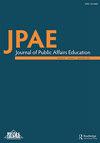Meeting the moment: Trauma responsive teaching for student success
IF 2.4
Q1 EDUCATION & EDUCATIONAL RESEARCH
引用次数: 0
Abstract
ABSTRACTClassroom environments, virtual and face-to-face, are changing; we are moving to focus more explicitly on students’ health and well-being and to ensure we actively promote anti-racist educational environments for students. This paper examines how we can enshrine those lessons into academic programs by institutionalizing a trauma-responsive approach to education; building upon key findings from student and adult development theories, then bridging the scholarship of teaching and learning literature as a guide for developing teaching practices that support individual student growth. We outline structured practices that faculty can utilize to improve learning and success for students who are experiencing personal, secondary, or institutional trauma while establishing boundaries in teaching. Five goals for trauma-responsive teaching include 1. Ensure safety; 2. Establish trustworthiness; 3. Maximize choice; 4. Maximize collaboration; and 5. Prioritize empowerment. We conclude by offering tangible practices to incorporate from syllabus changes to classroom discussion guidance and beyond.KEYWORDS: Equitable teaching approachtrauma-informed teachingtrauma-responsive pedagogy Disclosure statementNo potential conflict of interest was reported by the author(s).Notes1. The authors of this paper are aware of the extensive literature related to the influence of faculty intersectional identities like gender identity, race, accent, etc. on student ratings of instruction (Kreitzer & Sweet-Cushman, Citation2021; Redding, Citation2019; Subtirelu, Citation2015); the rapport building aspect of instruction identified here may be correlated with these identity relationships, however, there is not evidence to date that examines this intersection.2. The authors recognize that the politics of self-disclosure and admission of unfamiliarity/inexperience is complex. Disclosure of some identities is unavoidable, and people with minoritized identities may face more barriers for disclosing their experiences or admitting when they do not know something. The scope of this paper primarily exists within the classroom and student-instructor dynamics. However, if self-disclosure and saying “I don’t know” are not permissible for faculty in meetings or conversations with peers, this speaks to a larger institutional barrier that may prohibit this behavior change in the classroom. For these situations, a deeper exploration is required to tackle the systemic changes and incorporate trauma-responsive practices at the institutional level.Additional informationNotes on contributorsAnnie MillerAnnie Miller is an Assistant Clinical Professor and Associate Dean of Student Success and Strategic Initiatives at the University of Colorado Denver School of Public Affairs and leads Collaborative Management Consulting LLC. She is an active board member at the Laboratory to Combat Human Trafficking, and the co-PI for the Colorado Project to Comprehensively Combat Human Trafficking. Her scholarship focuses on the effectiveness of networks and collaborations seeking to combat human trafficking, trauma informed public management, and capacity development at the community and network levels to end wicked problems.Hope YohnHope Yohn graduated from Regis University with a BS and MS in Criminology. She has extensive management experience and is a Training, Learning, and Organizational Development professional, informing her passion for organizational behavior and effective management. She hopes to research the organizational culture of criminal justice institutions, including organizational barriers to employee wellness, crime prevention, rehabilitation, and effective policy implementation. Hope volunteers as a victim advocate for a local police department and facilitates trauma-informed workshops on nonviolent conflict resolutions in prisons and community groups with the Alternatives to Violence Project.Maren B. TrochmannMaren B. Trochmann is an Assistant Professor at the College of Charleston where she teaches in the MPA Program and the Political Science Department. Her research agenda focuses on social equity, public personnel administration, and the nexus between public administration theory and practice. In the broadest terms, her research focuses on equitable, just, and humane public service - both for those working within the public sector and for the citizens who interact with or benefit from public services.面对当下:创伤响应式教学促进学生成功
摘要课堂环境,无论是虚拟的还是面对面的,都在发生着变化;我们正在采取行动,更加明确地关注学生的健康和福祉,并确保我们积极促进学生的反种族主义教育环境。本文探讨了我们如何通过将创伤反应性教育方法制度化,将这些经验纳入学术课程;以学生和成人发展理论的主要发现为基础,然后将教学和学习文献的学术联系起来,作为开发支持学生个人成长的教学实践的指南。我们概述了结构化的实践,教师可以利用这些实践来改善学生的学习和成功,这些学生在建立教学界限的同时正在经历个人、次要或机构创伤。创伤反应性教学的五个目标包括:1。确保安全;2. 建立诚信;3.最大化的选择;4. 最大化的合作;和5。优先权利。最后,我们提供了切实可行的实践,从教学大纲的修改到课堂讨论指导等等。关键词:公平教学法创伤知情教学法创伤响应教学法披露声明作者未报告潜在的利益冲突。本文的作者注意到,有大量文献涉及教师交叉身份(如性别认同、种族、口音等)对学生教学评分的影响(Kreitzer & Sweet-Cushman, Citation2021;整理,Citation2019;Subtirelu Citation2015);这里提到的教学中融洽关系的建立可能与这些身份关系有关,然而,迄今为止还没有证据研究这种交集。作者认识到,自我披露和承认不熟悉/缺乏经验的政治是复杂的。一些身份的披露是不可避免的,少数身份的人在披露自己的经历或承认自己不知道的事情时可能会面临更多的障碍。本文的研究范围主要存在于课堂和师生动态。然而,如果教师在会议或与同龄人交谈时不允许自我表露和说“我不知道”,这就说明了一个更大的制度障碍,可能会禁止这种行为在课堂上发生变化。对于这些情况,需要进行更深入的探索,以解决系统变化并在制度层面纳入创伤反应实践。安妮·米勒(annie Miller)是科罗拉多大学丹佛公共事务学院的助理临床教授和学生成功与战略倡议副院长,并领导协作管理咨询有限责任公司。她是打击人口贩运实验室的活跃董事会成员,也是科罗拉多州全面打击人口贩运项目的共同负责人。她的研究重点是网络和合作的有效性,旨在打击人口贩运,创伤知情的公共管理,以及社区和网络层面的能力发展,以结束邪恶的问题。霍普·约翰霍普·约翰毕业于里吉斯大学,获得犯罪学学士和硕士学位。她拥有丰富的管理经验,是一名培训、学习和组织发展专家,她对组织行为和有效管理充满热情。她希望研究刑事司法机构的组织文化,包括组织障碍对员工健康,犯罪预防,康复,有效的政策执行。霍普志愿担任当地警察局的受害者倡导者,并通过“暴力替代方案项目”在监狱和社区团体中促进关于非暴力解决冲突的创伤知识讲习班。Maren B. Trochmann是查尔斯顿学院的助理教授,她在MPA项目和政治科学系任教。她的研究重点是社会公平、公共人事管理以及公共管理理论与实践的联系。从广义上讲,她的研究重点是公平、公正和人道的公共服务——既为那些在公共部门工作的人,也为那些与公共服务互动或从中受益的公民。
本文章由计算机程序翻译,如有差异,请以英文原文为准。
求助全文
约1分钟内获得全文
求助全文
来源期刊

JOURNAL OF PUBLIC AFFAIRS EDUCATION
EDUCATION & EDUCATIONAL RESEARCH-
CiteScore
5.00
自引率
36.00%
发文量
34
 求助内容:
求助内容: 应助结果提醒方式:
应助结果提醒方式:


